外研版(2019)Unit 1 A New Start (Using language Period 1-Grammar)课件
文档属性
| 名称 | 外研版(2019)Unit 1 A New Start (Using language Period 1-Grammar)课件 |  | |
| 格式 | pptx | ||
| 文件大小 | 1.7MB | ||
| 资源类型 | 试卷 | ||
| 版本资源 | 外研版(2019) | ||
| 科目 | 英语 | ||
| 更新时间 | 2022-08-30 10:59:04 | ||
图片预览

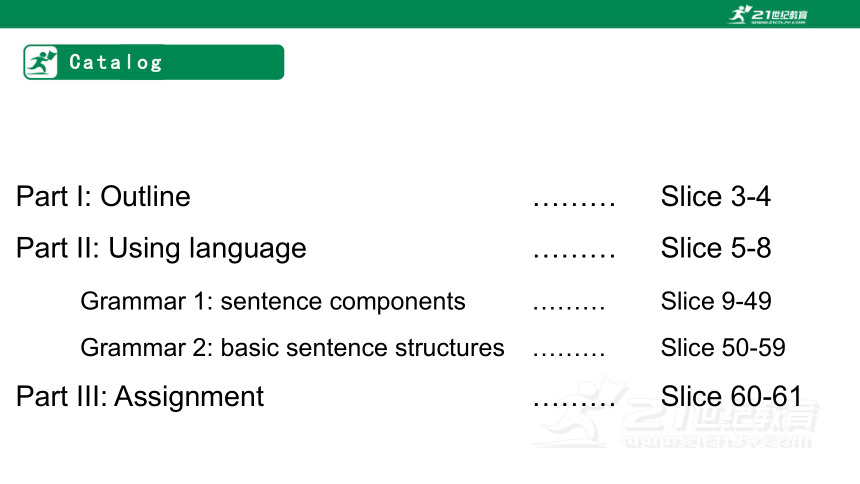
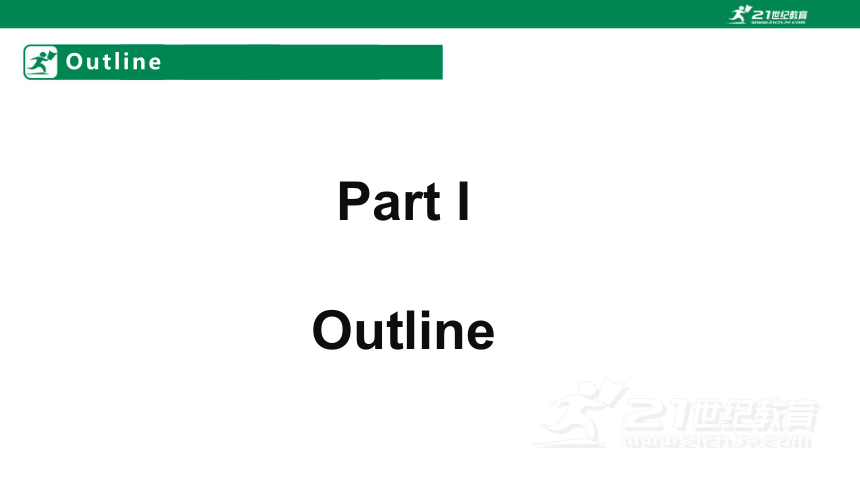
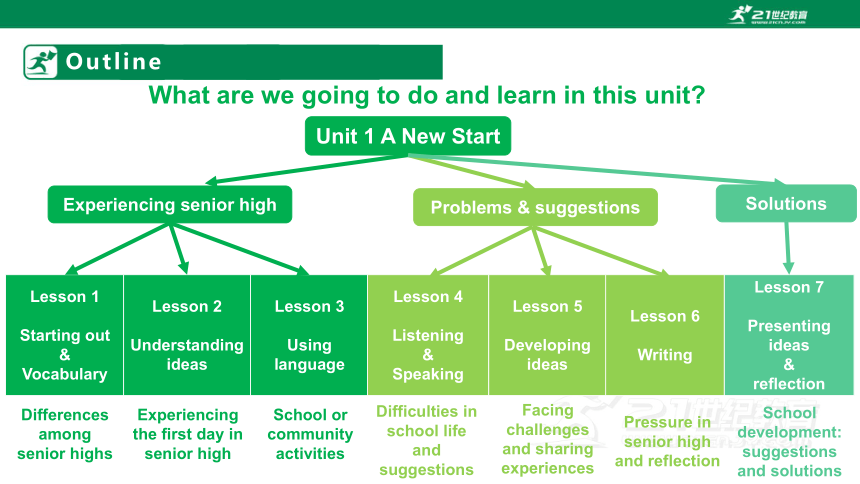
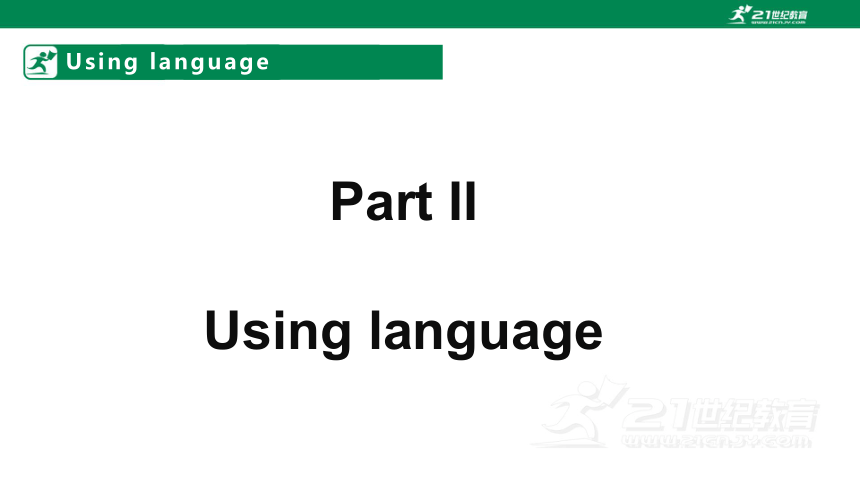

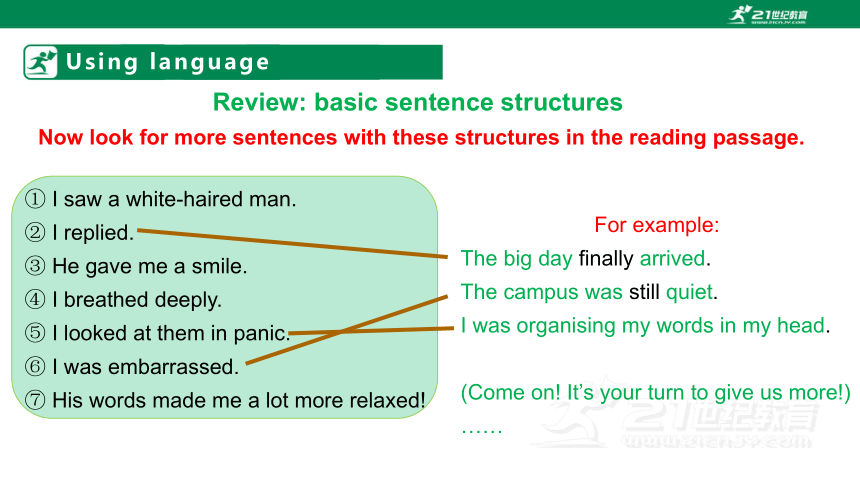
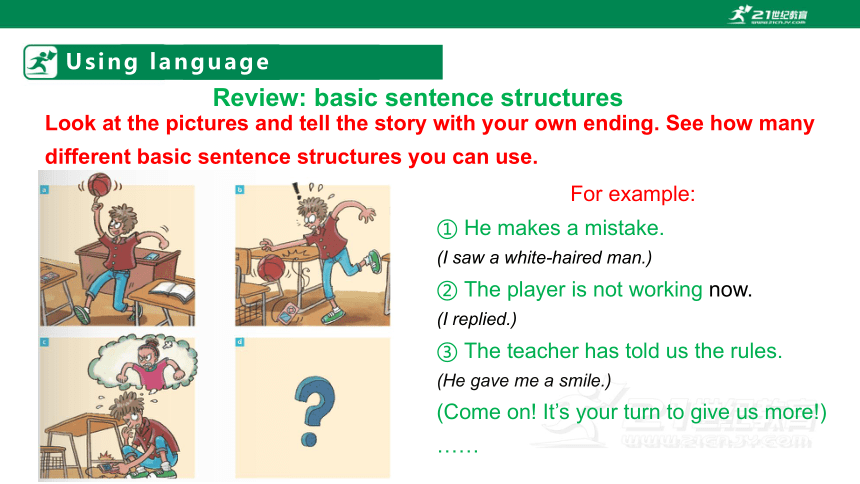
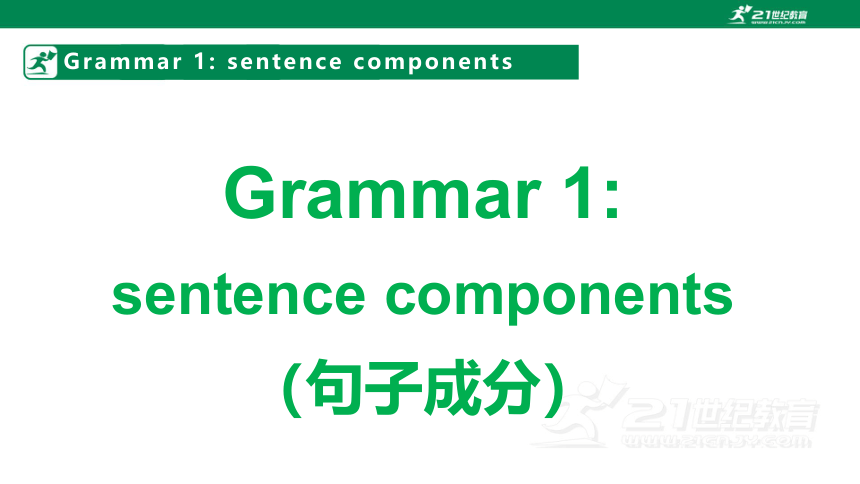
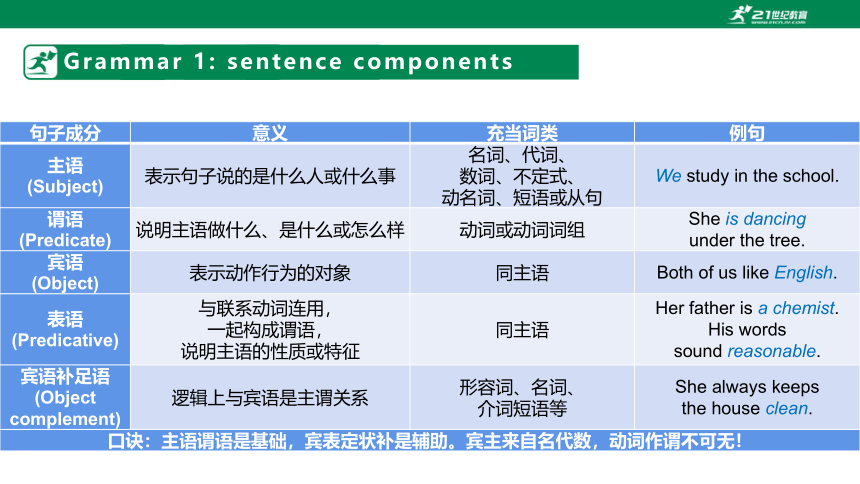
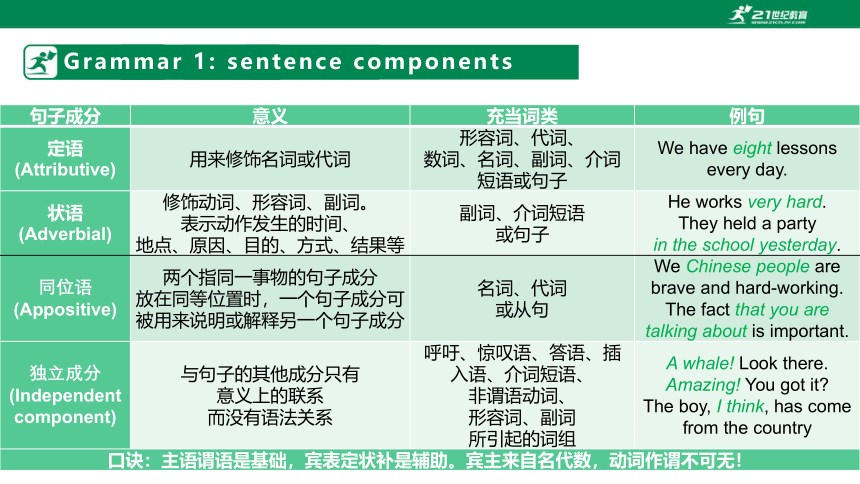
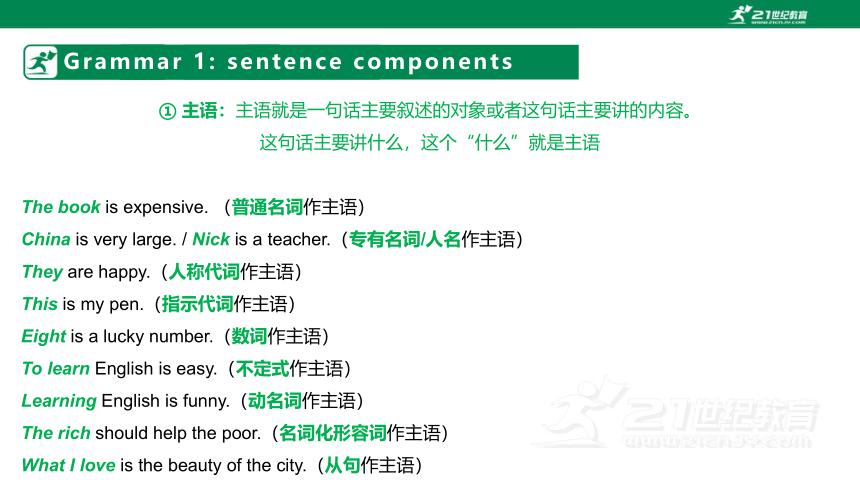
文档简介
(共63张PPT)
外研版必修一
Unit 1 A new start
Using language
Grammar
Catalog
Part I: Outline ……… Slice 3-4
Part II: Using language ……… Slice 5-8
Grammar 1: sentence components ……… Slice 9-49
Grammar 2: basic sentence structures ……… Slice 50-59
Part III: Assignment ……… Slice 60-61
Learning objectives
Outline
Part I
Outline
Outline
Lesson 1
Starting out
&
Vocabulary
Differences
among senior highs
Lesson 2
Understanding
ideas
Experiencing
the first day in senior high
Lesson 3
Using
language
School or community activities
Lesson 4
Listening
&
Speaking
Difficulties in school life and suggestions
Lesson 5
Developing
ideas
Facing challenges and sharing experiences
Pressure in senior high and reflection
Lesson 6
Writing
Lesson 7
Presenting
ideas
&
reflection
School development: suggestions and solutions
Unit 1 A New Start
What are we going to do and learn in this unit
Experiencing senior high
Problems & suggestions
Solutions
Learning objectives
Using language
Part II
Using language
Using language
Review: basic sentence structures
1. Match the sentences that share the same structures.
① I saw a white-haired man.
② I replied.
③ He gave me a smile.
④ I breathed deeply.
⑤ I looked at them in panic.
⑥ I was embarrassed.
⑦ His words made me a lot more relaxed!
a He was friendly.
b The exam made me quite nervous.
c I passed him a book.
d She agreed.
e He wrote a long letter.
f He talked loudly.
g She looked after her sister patiently.
Now look for more sentences with these structures in the reading passage.
Using language
Review: basic sentence structures
Now look for more sentences with these structures in the reading passage.
For example:
The big day finally arrived.
The campus was still quiet.
I was organising my words in my head.
(Come on! It’s your turn to give us more!)
……
① I saw a white-haired man.
② I replied.
③ He gave me a smile.
④ I breathed deeply.
⑤ I looked at them in panic.
⑥ I was embarrassed.
⑦ His words made me a lot more relaxed!
Using language
Review: basic sentence structures
Look at the pictures and tell the story with your own ending. See how many different basic sentence structures you can use.
For example:
① He makes a mistake.
(I saw a white-haired man.)
② The player is not working now.
(I replied.)
③ The teacher has told us the rules.
(He gave me a smile.)
(Come on! It’s your turn to give us more!)
……
Grammar 1: sentence components
Grammar 1:
sentence components
(句子成分)
Grammar 1: sentence components
句子成分 意义 充当词类 例句
主语 (Subject) 表示句子说的是什么人或什么事 名词、代词、 数词、不定式、 动名词、短语或从句 We study in the school.
谓语 (Predicate) 说明主语做什么、是什么或怎么样 动词或动词词组 She is dancing
under the tree.
宾语 (Object) 表示动作行为的对象 同主语 Both of us like English.
表语 (Predicative) 与联系动词连用, 一起构成谓语, 说明主语的性质或特征 同主语 Her father is a chemist.
His words
sound reasonable.
宾语补足语 (Object complement) 逻辑上与宾语是主谓关系 形容词、名词、 介词短语等 She always keeps
the house clean.
口诀:主语谓语是基础,宾表定状补是辅助。宾主来自名代数,动词作谓不可无!
Grammar 1: sentence components
句子成分 意义 充当词类 例句
定语 (Attributive) 用来修饰名词或代词 形容词、代词、 数词、名词、副词、介词短语或句子 We have eight lessons every day.
状语 (Adverbial) 修饰动词、形容词、副词。 表示动作发生的时间、 地点、原因、目的、方式、结果等 副词、介词短语 或句子 He works very hard.
They held a party
in the school yesterday.
同位语 (Appositive) 两个指同一事物的句子成分 放在同等位置时,一个句子成分可被用来说明或解释另一个句子成分 名词、代词 或从句 We Chinese people are brave and hard-working.
The fact that you are talking about is important.
独立成分(Independent component) 与句子的其他成分只有 意义上的联系 而没有语法关系 呼吁、惊叹语、答语、插入语、介词短语、 非谓语动词、 形容词、副词 所引起的词组 A whale! Look there.
Amazing! You got it
The boy, I think, has come from the country
口诀:主语谓语是基础,宾表定状补是辅助。宾主来自名代数,动词作谓不可无!
Grammar 1: sentence components
① 主语:主语就是一句话主要叙述的对象或者这句话主要讲的内容。
这句话主要讲什么,这个“什么”就是主语
The book is expensive. (普通名词作主语)
China is very large. / Nick is a teacher.(专有名词/人名作主语)
They are happy.(人称代词作主语)
This is my pen.(指示代词作主语)
Eight is a lucky number.(数词作主语)
To learn English is easy.(不定式作主语)
Learning English is funny.(动名词作主语)
The rich should help the poor.(名词化形容词作主语)
What I love is the beauty of the city.(从句作主语)
Grammar 1: sentence components
① 主语
特例之There be(存在句型)
在There be句型中,真正的主语出现在be动词之后(最后为地点或时间状语),如:
There are many students in the classroom.
本句中many students为主语,即Many students are there in the classroom.
There is some water on the ground.
本句中some water为主语,即Some water is there on the ground.
be动词还可以根据需要换成stand, exist等词,如:
There stands a big dog. ( = A big dog stands there.)
Grammar 1: sentence components
②谓语:说明主语动作或者状态的词语。
即说明主语做什么或者主语是什么,主语怎么样的词语。
牢记:只有”动词原形(do)、动词单三形式(does)、动词过去式(did)”三种形式可以充当谓语动词!
“to do, doing, done”三种形式为非谓语动词!
She eats an apple every day.(动词单三形式作谓语)
I have finished my homework already. (复合谓语,动词原形开头)
They went to the part together. (动词过去式作谓语)
We should use every chance to learn. (复合谓语,情态动词开头)
I was a student 10 years ago.(动词过去式作谓语)
Where did you go last night (复合谓语,助动词开头)
Grammar 1: sentence components
③表语:说明主语的身份、性质、状况等含义的成分(表语就是对主语的补充说明)
出现在系动词后
(常见的系动词: be, become, get, come, go, appear, seem, look, sound, feel, fall等)
Her face turned red. (形容词作表语)
He is a boy. (名词作表语)
Five plus two is seven. (数词作表语)
We are here. (副词作表语)
The house is on fire. (介词短语作表语)
Seeing is believing. (动名词作表语)
Our duty is to make our environment better. (不定式作表语)
Is this what you want (从句作表语)
Grammar 1: sentence components
④宾语:指一个动作(动词)的接受者
出现在谓语动词后或介词后
She bought a house yesterday. (名词作宾语)
He said nothing during the meeting. (代词作宾语)
He pretended not to see me. (不定式短语)
I enjoy listening to popular music. (动名词短语)
I have finished two of the assignments. (数词作宾语)
We need to help the disabled. (名词化形容词作宾语)
You don’t understand what I said. (从句作宾语)
Grammar 1: sentence components
双宾语
双宾语: 有些动词后面可跟直接宾语和间接宾语
直接宾语指的是动词所涉及的物(即sth),间接宾语是指受益于动词所表示行为的人(即sb)。
如果间接宾语出现在前,则直接采用”谓语动词+间接宾语+直接宾语”结构。如:
They gave him a watch.
如果直接宾语出现在前,则后面必须有to或for才能够引出间接宾语
即”谓语动词+直接宾语+to/for+间接宾语”结构,如:
= They gave a watch to him.
下面我们一起研究一下常见的可接双宾语的动词
(人/sb:间接宾语)
(物/sth:直接宾语)
(物/sth:直接宾语)
(人/sb:间接宾语)
Grammar 1: sentence components
双宾语
双宾语易位时需借助介词to的常用动词
Using “TO” Meaning
award sb. sth. = award sth. to sb. 颁奖给某人
bring sb. sth. = bring sth. to sb. 把某物带给某人
hand sb. sth. =hand sth. to sb. 把某物递给某人
lend sb. sth. = lend sth. to sb. 把某物借给某人
mail sb. sth. = mail sth. to sb. 把某物寄给某人
offer sb. sth. = offer sth. to sb. 将某物给某人
owe sb. sth. = owe sth. to sb. 欠某人某物
pass sb. sth. = pass sth. to sb. 把某物递给某人
pay sb. sth. = pay sth. to sb. 付给某人某物(钱)
post sb. sth. = post sth. to sb. 把某物寄给某人
read sb. sth. = read sth. to sb. 把某物读给某人听
Grammar 1: sentence components
双宾语
双宾语易位时需借助介词to的常用动词
Using “TO” Meaning
return sb. sth. = return sth. to sb. 把某物还给某人
send sb. sth. = send sth. to sb. 把某物送给某人
sell sb. sth. = sell sth. to sb. 把某物卖给某人
serve sb. sth. = serve sth. to sb. 拿某物招待某人
show sb. sth. = show sth. to sb. 拿某物给某人看
take sb. sth. = take sth. to sb. 把某物拿给某人
teach sb. sth. = teach sth. to sb. 教某人某物
tell sb. sth. = tell sth. to sb. 告诉某人某情况
throw sb. sth. = throw sth. to sb. 把某物扔给某人
write sb. sth. = write sth. to sb. 给某人写信
Grammar 1: sentence components
双宾语
双宾语易位时需借助介词for的常用动词
Using “FOR” Meaning
book sb. sth. = book sth. for sb. 为某人预定某物
buy sb. sth. = buy sth. for sb. 为某人买某物
choose sb. sth. = choose sth. for sb. 为某人选某物
cook sb. sth. = cook sth. for sb. 为某人煮某物
draw sb. sth. = draw sth. for sb. 为某人画某物
fetch sb. sth. = fetch sth. for sb. 为某人去取某物
find sb. sth. = find sth. for sb. 为某人找到某物
fix sb. sth. = fix sth. for sb. 为某人准备某物
get sb. sth. = get sth. for sb. 为某人拿来某物
Grammar 1: sentence components
双宾语
双宾语易位时需借助介词for的常用动词
Using “FOR” Meaning
make sb. sth. = make sth. for sb. 为某人做某物
order sb. sth. = order sth. for sb. 为某人订购某物
pick sb. sth. = pick sth. for sb. 为某人采摘某物
prepare sb. sth. = prepare sth. for sb. 为某人准备某物
save sb. sth. = save sth. for sb. 为某人留某物
sing sb. sth. = sing sth. for sb. 为某人唱某物(歌)
spare sb. sth. = spare sth. for sb. 为某人让出某物
steal sb. sth. = steal sth. for sb. 为某人偷某物
Grammar 1: sentence components
双宾语
Extra: 不必过于纠结双宾语易位时到底用 ”to” 还是 ”for” :
① 这早已不是任何一类正规考试的方向;
② 其次大部分动词后面接 to或 for早已无区别或不影响理解,如:
Bring your papers to/for me.
He bought what he had promised for/to us.
③ 通常在双宾语中for表示”意图对象/主观”,to表示”实际到达对象/客观”
(简单理解即可,不必过于较真)
I cook it for you. (到没到不知道/主观)
I already sent the letter to you. (实际寄到的对象/客观)
Grammar 1: sentence components
双宾语
较为固定 (即双宾语通常情况下不易位)
既不用to也不用for
Words Using “NOTHING” Meaning
allow ask cause charge cost forgive refuse etc. He allows his son too much money. 他给他儿子的钱太多。
He asked me some questions. 他问了我一些问题。
This caused me much trouble. 这给我带来了许多麻烦。
He charged me five dollars for a cup of tea. 他一杯茶向我要了5美元。
His mistake cost him his job. 他的错误让他丢了工作。
I envy you your good luck. 我羡慕你的好运。
They forgave him his rudeness. 他们原谅了他的鲁莽。
He refused her nothing. 她要什么他就给什么
Grammar 1: sentence components
双宾语
少数动词引出间接宾语后需要加of才能引出直接宾语
Using “OF” Meaning
accuse sb of sth 控告某人某罪
convince sb of sth 使某人相信某事
cure sb of sth 治愈某人某病/改掉某人不良习惯
inform sb of sth 通知某人某事
persuade sb of sth 使某人相信某事
remind sb of sth 使某人想起某事
rob sb of sth 抢某人某物
suspect sb of sth 怀疑某人(做了)某事
warn sb of sth 警告某人某事/某物
Grammar 1: sentence components
双宾语
特殊双宾语结构: v + to sb + sth = v + sth + to sb
Words Examples
declare, describe, drink, deliver, explain, express, announce, admit, repeat, report, retell, mention, murmur, mutter, introduce, say, suggest, whisper, communicate etc (口诀: Dear Miss WC) explain to sb sth = explain sth to sb She didn’t explain to me the reason. She didn’t explain
the reason to me.
express to sb sth = express sth to sb We express to her our gratitude. We express
our gratitude to her.
announce to sb sth = announce sth to sb The teacher announces to us the arrival time. The teacher announces
the arrival time to us.
report to sb sth = report sth to sb I reported to the police the accident. I reported
the accident to the police.
suggest to sb sth = suggest st to sb Our teacher suggested to us a new learning method. Our teacher suggested a new learning method to us.
admit to sb sth = admit sth to sb He didn’t admit to us his mistake. He didn’t admit
his mistake to us.
Grammar 1: sentence components
复合宾语
复合宾语: 有些动词接了一个宾语后句子意思仍不完整
还需要再加上一个词或短语放在宾语之后来补充说明其身份、特征、状态或所做的动作
这种“宾语+宾语补足语”结构称为复合宾语。
复合宾语,即”宾语补足语”,将是我们接下来研究的重点内容之一。
Grammar 1: sentence components
⑤宾语补足语(即复合宾语):某些及物动词不仅需要宾语,而且还要求某个词或词组来补充说明宾语.
即表示宾语代表的人或物所发出的动作或所处的状态
这个词或短语称为宾语补足语
We made him a birthday cake. (名词作宾补)
I tried my best to make him happy. (形容词作宾补)
Please let him in. (副词作宾补)
I put my family first. (数词作宾补)
We call him a nice man. (名词短语作宾补)
He advised me to give up smoking. (不定式短语作宾补)
I saw him running down the street. (动名词短语作宾补)
I found him reading my letter. (现在分词作宾补)
I noticed him in tears. (介词短语作宾补)
Grammar 1: sentence components
⑤宾语补足语(即复合宾语)
常见的接to do做宾补的动词
Using “TO DO” Meaning
advise sb. to do sth. 建议某人做某事
allow sb. to do sth. 允许某人做某事
ask sb. to do sth. 请/叫某人做某事
bear sb. to do sth. 忍受某人做某事
beg sb. to do sth. 请求某人做某事
cause sb. to do sth. 导致某人做某事
command sb. to do sth. 命令某人做某事
drive sb. to do sth . 驱使某人做某事
elect sb. to do sth. 选举某人做某事
encourage sb. to do sth. 鼓励某人做某事
expect sb. to do sth. 期望某人做某事
forbid sb. to do sth. 禁止某人做某事
force sb. to do sth. 强迫某人做某事
Grammar 1: sentence components
⑤宾语补足语(即复合宾语)
常见的接to do做宾补的动词
Using “TO DO” Meaning
get sb. to do sth. 使(要)某人做某事
hate sb. to do sth. 讨厌某人做某事
help sb. to do sth. 帮助某人做某事
intend sb. to do sth. 打算要某人做某事
invite sb. to do sth. 邀请某人做某事
leave sb. to do sth. 留下某人做某事
like sb. to do sth. 喜欢某人做某事
mean sb. to do sth. 打算要某人做某事
need sb. to do sth. 需要某人做某事
oblige sb. to do sth. 迫使某人做某事
order sb. to do sth. 命令某人做某事
permit sb. to do sth. 允许某人做某事
persuade sb. to do sth. 说服某人做某事
Grammar 1: sentence components
⑤宾语补足语(即复合宾语)
常见的接to do做宾补的动词
Using “TO DO” Meaning
prefer sb. to do sth. 宁愿某人做某事
request sb. to do sth. 要求某人做某事
remind sb. to do sth. 提醒某人做某事
teach sb. to do sth . 教某人做某事
tell sb. to do sth. 告诉某人做某事
train sb. to do sth. 训练某人做某事
trouble sb. to do sth. 麻烦某人做某事
want sb. to do sth. 想要某人做某事
warn sb. to do sth. 警告某人做某事
wish sb. to do sth. 希望某人做某事
Grammar 1: sentence components
⑤宾语补足语(即复合宾语)
常见的接to do做宾补的动词短语
Phrases Examples
wait for call on depend on care for long for etc. We call on the students to act now!
It depends on you to make the final decision.
The boss doesn’t care for the staff to be late.
Grammar 1: sentence components
⑤宾语补足语(即复合宾语)
常见的接do做宾补的动词
Using “DO” Meaning
feel sb. do sth. 感觉某人做某事
have sb. do sth. 使某人做某事
hear sb. do sth. 听见某人做某事
let sb. do sth. 让某人做某事
listen to sb. do sth. 听着某人做某事
look at sb. do sth. 看着某人做某事
make sb. do sth. 使某人做某事
notice sb. do sth. 注意某人做某事
observe sb. do sth. 观察某人做某事
see sb. do sth. 看见某人做某事
watch sb. do sth. 观察某人做某事
Grammar 1: sentence components
⑤宾语补足语(即复合宾语)
常见的接doing/现在分词做宾补的动词
Using “DOING” Meaning
bring sb. doing sth. 引起某人做某事
catch sb. doing sth. 碰上(撞上)某人做某事
discover sb. doing sth. 发现某人做某事
feel sb. doing sth. 感觉某人做某事
find sb. doing sth. 碰上(撞上)某人做某事
get sb. doing sth. 使某人做某事
have sb. doing sth. 使某人做某事
hear sb. doing sth. 听见某人做某事
keep sb. doing sth. 使某人不停地做某事
listen to sb. doing sth. 听某人做某事
Grammar 1: sentence components
⑤宾语补足语(即复合宾语)
常见的接doing/现在分词做宾补的动词
Using “DOING” Meaning
look at sb. doing sth. 看着某人做某事
notice sb. doing sth. 注意到某人做某事
observe sb. doing sth. 观察某人做某事
prevent sb. doing sth. 阻止某人做某事
see sb. doing sth. 看见某人做某事
send sb. doing sth. 使某人(突然)做某事
set sb. doing sth. 使(引起)某人做某事
start sb. doing sth. 使某人开始做某事
stop sb. doing sth. 阻止某人做某事
watch sb. doing sth. 观察某人做某事
Grammar 1: sentence components
⑤宾语补足语(即复合宾语)
常见的接现在分词/过去分词做宾补的动词
Words 现在分词 过去分词
功能 表宾语和分词是主动关系 表表宾语和分词是被动关系
感官动词: 如 feel, hear, listen to, see, watch,notice, observe, look at 等 I didn’t notice him leaving the room. I hear him singing now. He noticed the boy robbed.
I once heard the story told when I was young.
find等词 We just found an old man lying on the ground! He found the glass broken.
表示“致使”动词,如 get,have,leave 等 Don’t leave the water running. I got/had my TV set fixed.
Grammar 1: sentence components
⑤宾语补足语(即复合宾语)
常见的接现在分词/过去分词做宾补的动词
常接 现在分词 常接 过去分词
功能 表宾语和分词是主动关系 功能 表表宾语和分词是被动关系
set, start, catch等 The failure set us wondering what should be improved. The life in senior high starts me thinking deeper and wider. 表示“意欲;命令”的动词。如 like,want,wish,order 等 You must tell us how you would like it finished.
Tom wanted his son taught in a perfect way.
I wish it done quickly.
make等 Have I made myself understood
I can’t make myself heard if you keep talking.
Grammar 1: sentence components
⑤宾语补足语(即复合宾语)
常见特殊形式的宾补动词
特殊形式 Meaning
excuse/forgive sb. for doing sth. 原谅某人做某事
arrange for sb. to do sth. 安排某人做某事
demand of sb. to do sth. 要求某人做某事
thank sb. for doing sth. 感谢某人做某事
congratulate sb. on doing sth. 祝贺某人做某事
stop/prevent sb. (from) doing sth. 阻止某人做某事
keep sb. from doing sth. 阻止某人做某事
Grammar 1: sentence components
双宾语 vs 复合宾语
如何区分一个动词后面是接了双宾语还是宾语补足语?
①常见的接双宾语的动词有: give, show, bring, read, pass, send, lend, tell, ask, leave, teach, write, buy, sing等。如:
The teacher gives each of them an eraser.
常见的接宾语补足语/复合宾语的动词有: let, see, watch, hear, help, feel, keep, call, make, find, tell, ask, think, want等。如:
We must keep the classroom clean.
Grammar 1: sentence components
双宾语 vs 复合宾语
②在双宾语中,能充当间接宾语或是直接宾语的一般是名词或代词。如:
She showed us (pron.) a new TV set (n.).
而在复合宾语/宾语补足语中,能充当宾语补足语成分的则较多
如名词、形容词、副词、介词短语、动词不定式(短语)和分词(短语)等
We call him Lao Li (n.).
They must keep their hands behind their backs (prepositional phrase).
I won’t let you try again (infinitive phrase).
The other students in the class keep their eyes closed (past participle).
Grammar 1: sentence components
双宾语 vs 复合宾语
③在双宾语中,两个宾语间的关系比较松散,有的句子去掉其中一个宾语,句子仍然成立。
双宾语一般表示“为谁(for sb)或给谁(to sb)……”
即“及物动词+间接宾语+直接宾语”的结构可以改写为“及物动词+直接宾语+for sb或to sb”的结构
如:
Please show me your new book.
= Please show your new book to me.
She bought me some tomatoes.
= She bought some tomatoes for me.
Grammar 1: sentence components
双宾语 vs 复合宾语
宾语和宾语补足语之间关系比较紧密,去掉其中一个成分,句子就不能成立或句意不完整。
而且当名词、形容词、副词、介词短语作宾语补足语时,和宾语之间具有“主系表关系”
当不定式(短语)或分词(短语)作宾语补足语时,和宾语之间具有“主谓关系”。如:
We made Tom monitor.
We will make our country more beautiful.
You should keep your dog in.
I found him in Room 201.
He makes us work ten hours a day.
We heard her singing in the room.
= Tom is monitor.
= Our country will be more beautiful.
= Your dog should be in.
= He was in Room 201.
= We work ten hours a day.
= She was singing in the room.
Grammar 1: sentence components
⑥定语:用于描述名词,代词,短语或从句的性质,特征,范围等情况的成分
如果定语是单个词,定语放在被修饰词的前面
如果定语是词组,定语放在被修饰词的后面
She gave me a book yesterday. (冠词作定语)
I don’t think he is a responsible father. (形容词作定语)
The summer vacation is finally coming! (名词作定语)
We have 35/thirty-five students in the class. (数词作定语)
Would you please bring me today‘s newspaper (’s所有格作定语)
The windows of the house are broken. (of所有格作定语/后置)
I don’t know her name. (代词作定语)
Do you know the way to the hotel (介词短语作定语/后置)
Grammar 1: sentence components
⑥定语:用于描述名词,代词,短语或从句的性质,特征,范围等情况的成分
如果定语是单个词,定语放在被修饰词的前面
如果定语是词组,定语放在被修饰词的后面
The newspaper today is sold out. (副词作定语/后置)
The destroyed bridge was rebuilt last winter. (过去分词作定语)
I know a boy called Tom. (过去分词短语作定语/后置)
Listen, the flying birds are singing. (现在分词作定语)
The cars running on the street are so noisy. (现在分词作定语/后置)
She has two children to take care of. (不定式作定语/后置)
The reading room is so small. (动名词作定语)
The concept living alone is more and more popular. (动名词短语作定语/后置)
He who makes no mistakes makes nothing. (从句作定语/后置)
Grammar 1: sentence components
定语的后置
①副词作定语时后置:
People there are talking so loudly.
Is there a supermarket nearby
②短语作定语时后置:
The boy swimming in the river is my friend.
Would you like something to eat
③副词else与不定代词、疑问代词连用作定语时后置:
What else do you want to say
I have nothing else to add.
Grammar 1: sentence components
定语的后置
④不定代词的定语后置:
I have something important to tell you.
Don’t worry. It’s nothing serious.
⑤基数词、英文字母作定语时后置:
Let’s turn to Unit 7.
Look at Picture B.
⑥enough在修饰名词时既可前置也可后置:
We don’t have food enough (enough food) to eat.
⑦从句作定语时要后置:
He who laughs last laughs best.
Grammar 1: sentence components
⑦状语:用来修饰动词、形容词、副词或整个句子
通常由副词,副词短语,介词短语或句子充当
状语通常置于谓语动词或宾语之后
状语通常的顺序是:方式,地点,时间等
状语分为很多种,有时间状语,地点状语,方式状语,原因状语,目的状语等等
状语位置极其灵活,可根据具体情况放在不同位置
The children were playing in the park. (介词短语作状语/表地点)
He did not play well enough to win. (副词短语作状语/表程度)
He did not play well enough to win. (不定式作状语/表目的)
She always comes to my house. (副词作状语/表频率)
I won’t go shopping if it rains this afternoon. (从句作状语/表条件)
Getting up late, he hurried to school. (分词短语作状语/表原因)
Grammar 1: sentence components
⑧同位语
⑨独立成分
非本单元研究对象
今后会单独专题讲解
Grammar 1: sentence components
分析下列划线部分在句中所作的成分
1. The students got on the school bus.
2. He handed me the newspaper.
3. I shall answer your question after class.
4. What a beautiful Chinese painting!
5. They went hunting together early in the morning.
6. His job is to train swimmers.
7. He took many photos of the palaces in Beijing.
8. There is going to be an American film tonight.
9. He is to leave for Shanghai tomorrow.
10. His wish is to become a scientist.
n. – Subject
n. – Attributive
pron. – Object
v. – Predicate
prep. phrase – Adverbial
adj. – Attributive
adv. & adv. – Adverbial
prep. phrase – Adverbial
adj. – Attributive
infinitive phrase – Predicative
n. – Object
prep. phrase – Adverbial
v. – Predicate
n. phrase – Subject
v. – Predicate
n. – Subject
infinitive phrase – Predicative
Grammar 1: sentence components
分析下列划线部分在句中所作的成分
11. He managed to finish the work in time.
12. Tom came to ask me for advice.
13. He found it important to master English.
14. Do you have anything else to say
15. To be honest, your pronunciation is not so good.
16. Would you please tell me your address
17. He sat there, reading a newspaper.
18. It is our duty to keep our classroom clean and tidy.
19. He noticed a man enter the room.
20. The apples tasted sweet.
v. – Predicate
n. – Object
infinitive phrase & prep. phrase – Adverbial
pron. – Empty Object
infinitive phrase – real Object
pron. – Object
infinitive phrase – Attributive
infinitive phrase – Adverbial
pron. – Indirect Object
pron. phrase – Direct Object
adv. – Adverbial
present participle – Adverbial
pron. – Empty Subject
pron. phrase – Predicative
adj. – Object Complement
infinitive phrase – Object Complement
adj. – Predicative
Grammar 2: basic sentence structures
Grammar 2:
basic sentence structures
(基本句型)
Grammar 2: basic sentence structures
简单句的几种基本句型
① S + Vi (主+谓)
The sun │ was shining.
The moon │ rose.
We all │ breathe, eat, and drink.
Who │ cares
What he said │ does not matter.
They │ talked for half an hour.
Grammar 2: basic sentence structures
简单句的几种基本句型
② S + Vt + O (主+谓+宾)
Who │knows │the answer
She │thanked │her mother.
He │is making │a cake.
He │enjoys │reading.
They │ate │what was left over.
He │said │"Good morning."
I │want │to have a cup of tea.
Grammar 2: basic sentence structures
简单句的几种基本句型
③S + Link V + P (主 + 系 + 表)
This │is │an English-Chinese dictionary.
The dinner │smells │good.
He │feels │a little tired.
Everything │looks │different.
He │is growing │tall and strong.
The trouble │is │that they are short of money.
Our well │goes │dry.
Grammar 2: basic sentence structures
简单句的几种基本句型
④ S + V+ IO + DO (主 + 谓 + 间接宾语 + 直接宾语)
She │is making │herself │a new dress.
= She │is making │a new dress │for herself.
She │cooked │her husband │a delicious meal.
= She │cooked │a delicious meal │for her husband.
I │will give │my car │a wash.
= I │will give │a wash │to my car.
Grammar 2: basic sentence structures
简单句的几种基本句型
⑤ S + V + O + C (主 + 谓 + 宾 + 宾补)
They │are painting │the door │green.
They │find │the house │empty
What │makes │him │so happy
We │saw │him │out.
He │asked │me │to come back soon.
I │saw │them │getting on the bus.
Grammar 2: basic sentence structures
简单句的几种基本句型
⑥ S + V + A (主 + 谓 + 状)
He │runs │fast.
He │gets up │early (│) in the morning.
The sun │rose │slowly.
Amy │is crying │sadly.
She │sings │well.
She │sits │behind me.
The rain │stopped │suddenly.
Grammar 2: basic sentence structures
简单句的几种基本句型
⑦ S + V + O + A (主 + 谓 + 宾 + 状)
He │went │to school │by bike.
You │must follow │the rules │carefully.
I │want │a pair of shoes │in brown.
He │left │the room │without saying anything.
We │will play │football │if it doesn’t rain.
Who │passed │the exam │yesterday
I │haven’t heard │from him │since the day he left.
Grammar 2: basic sentence structures
分析下列句子的句型
1. Our school is not far from my home.
2. It is a great pleasure to talk with you
3. All of us considered him honest.
4. My grandfather bought me a pair of sports shoes.
5. He broke a piece of glass.
6. He made it clear that he would leave the city.
7. I love you more than her.
8. Tees turn green when spring comes.
9. They pushed the door open.
10. Grandma told me an interesting story last night.
S + Link V + P + Adverbial
S + Link V + P + Adverbial
S + V + O + C
S + V + IO + DO
S + V + O
S + V + EO(it) + C + O
S + V + O
S + Link V + P + Adverbial
S + V + O + C
S + V + IO + DO + Adverbial
Grammar 2: basic sentence structures
分析下列句子的句型
11. He wrote carefully some letters to his friends.
12. All the students think highly of his teaching
13. We need a place twice larger than this one.
14. He asked us to sing an English song.
15. The cars made in Japan are better than those in Germany.
16. We will make our school more beautiful.
17. He didn't come. That is why he didn't know.
18. She showed us her many of her pictures.
19. The old man lives a lonely life.
20. Luckily the 1989 earthquake did not happen in the center of town.
S + V + IO + DO
S + V + O
S + V + O
S + V + O + C
S + Link V + P
S + V + O + C
S + V. S + Link V + P
S + V + IO + DO
S + V + Adverbial
S + V + Adverbial
Assignment
Part III
Assignment
Assignment
1. Review what we learned, especially the key parts;
2. Recite all the key words and expressions, paraphrases and derivative words included;
3. Understand all the key parts of “sentence components” and “sentence structures”;
4. Preview “the latter part of using language” and “developing ideas”.
Thank You
21世纪教育网(www.21cnjy.com)
中小学教育资源网站
兼职招聘:
https://www.21cnjy.com/recruitment/home/admin
外研版必修一
Unit 1 A new start
Using language
Grammar
Catalog
Part I: Outline ……… Slice 3-4
Part II: Using language ……… Slice 5-8
Grammar 1: sentence components ……… Slice 9-49
Grammar 2: basic sentence structures ……… Slice 50-59
Part III: Assignment ……… Slice 60-61
Learning objectives
Outline
Part I
Outline
Outline
Lesson 1
Starting out
&
Vocabulary
Differences
among senior highs
Lesson 2
Understanding
ideas
Experiencing
the first day in senior high
Lesson 3
Using
language
School or community activities
Lesson 4
Listening
&
Speaking
Difficulties in school life and suggestions
Lesson 5
Developing
ideas
Facing challenges and sharing experiences
Pressure in senior high and reflection
Lesson 6
Writing
Lesson 7
Presenting
ideas
&
reflection
School development: suggestions and solutions
Unit 1 A New Start
What are we going to do and learn in this unit
Experiencing senior high
Problems & suggestions
Solutions
Learning objectives
Using language
Part II
Using language
Using language
Review: basic sentence structures
1. Match the sentences that share the same structures.
① I saw a white-haired man.
② I replied.
③ He gave me a smile.
④ I breathed deeply.
⑤ I looked at them in panic.
⑥ I was embarrassed.
⑦ His words made me a lot more relaxed!
a He was friendly.
b The exam made me quite nervous.
c I passed him a book.
d She agreed.
e He wrote a long letter.
f He talked loudly.
g She looked after her sister patiently.
Now look for more sentences with these structures in the reading passage.
Using language
Review: basic sentence structures
Now look for more sentences with these structures in the reading passage.
For example:
The big day finally arrived.
The campus was still quiet.
I was organising my words in my head.
(Come on! It’s your turn to give us more!)
……
① I saw a white-haired man.
② I replied.
③ He gave me a smile.
④ I breathed deeply.
⑤ I looked at them in panic.
⑥ I was embarrassed.
⑦ His words made me a lot more relaxed!
Using language
Review: basic sentence structures
Look at the pictures and tell the story with your own ending. See how many different basic sentence structures you can use.
For example:
① He makes a mistake.
(I saw a white-haired man.)
② The player is not working now.
(I replied.)
③ The teacher has told us the rules.
(He gave me a smile.)
(Come on! It’s your turn to give us more!)
……
Grammar 1: sentence components
Grammar 1:
sentence components
(句子成分)
Grammar 1: sentence components
句子成分 意义 充当词类 例句
主语 (Subject) 表示句子说的是什么人或什么事 名词、代词、 数词、不定式、 动名词、短语或从句 We study in the school.
谓语 (Predicate) 说明主语做什么、是什么或怎么样 动词或动词词组 She is dancing
under the tree.
宾语 (Object) 表示动作行为的对象 同主语 Both of us like English.
表语 (Predicative) 与联系动词连用, 一起构成谓语, 说明主语的性质或特征 同主语 Her father is a chemist.
His words
sound reasonable.
宾语补足语 (Object complement) 逻辑上与宾语是主谓关系 形容词、名词、 介词短语等 She always keeps
the house clean.
口诀:主语谓语是基础,宾表定状补是辅助。宾主来自名代数,动词作谓不可无!
Grammar 1: sentence components
句子成分 意义 充当词类 例句
定语 (Attributive) 用来修饰名词或代词 形容词、代词、 数词、名词、副词、介词短语或句子 We have eight lessons every day.
状语 (Adverbial) 修饰动词、形容词、副词。 表示动作发生的时间、 地点、原因、目的、方式、结果等 副词、介词短语 或句子 He works very hard.
They held a party
in the school yesterday.
同位语 (Appositive) 两个指同一事物的句子成分 放在同等位置时,一个句子成分可被用来说明或解释另一个句子成分 名词、代词 或从句 We Chinese people are brave and hard-working.
The fact that you are talking about is important.
独立成分(Independent component) 与句子的其他成分只有 意义上的联系 而没有语法关系 呼吁、惊叹语、答语、插入语、介词短语、 非谓语动词、 形容词、副词 所引起的词组 A whale! Look there.
Amazing! You got it
The boy, I think, has come from the country
口诀:主语谓语是基础,宾表定状补是辅助。宾主来自名代数,动词作谓不可无!
Grammar 1: sentence components
① 主语:主语就是一句话主要叙述的对象或者这句话主要讲的内容。
这句话主要讲什么,这个“什么”就是主语
The book is expensive. (普通名词作主语)
China is very large. / Nick is a teacher.(专有名词/人名作主语)
They are happy.(人称代词作主语)
This is my pen.(指示代词作主语)
Eight is a lucky number.(数词作主语)
To learn English is easy.(不定式作主语)
Learning English is funny.(动名词作主语)
The rich should help the poor.(名词化形容词作主语)
What I love is the beauty of the city.(从句作主语)
Grammar 1: sentence components
① 主语
特例之There be(存在句型)
在There be句型中,真正的主语出现在be动词之后(最后为地点或时间状语),如:
There are many students in the classroom.
本句中many students为主语,即Many students are there in the classroom.
There is some water on the ground.
本句中some water为主语,即Some water is there on the ground.
be动词还可以根据需要换成stand, exist等词,如:
There stands a big dog. ( = A big dog stands there.)
Grammar 1: sentence components
②谓语:说明主语动作或者状态的词语。
即说明主语做什么或者主语是什么,主语怎么样的词语。
牢记:只有”动词原形(do)、动词单三形式(does)、动词过去式(did)”三种形式可以充当谓语动词!
“to do, doing, done”三种形式为非谓语动词!
She eats an apple every day.(动词单三形式作谓语)
I have finished my homework already. (复合谓语,动词原形开头)
They went to the part together. (动词过去式作谓语)
We should use every chance to learn. (复合谓语,情态动词开头)
I was a student 10 years ago.(动词过去式作谓语)
Where did you go last night (复合谓语,助动词开头)
Grammar 1: sentence components
③表语:说明主语的身份、性质、状况等含义的成分(表语就是对主语的补充说明)
出现在系动词后
(常见的系动词: be, become, get, come, go, appear, seem, look, sound, feel, fall等)
Her face turned red. (形容词作表语)
He is a boy. (名词作表语)
Five plus two is seven. (数词作表语)
We are here. (副词作表语)
The house is on fire. (介词短语作表语)
Seeing is believing. (动名词作表语)
Our duty is to make our environment better. (不定式作表语)
Is this what you want (从句作表语)
Grammar 1: sentence components
④宾语:指一个动作(动词)的接受者
出现在谓语动词后或介词后
She bought a house yesterday. (名词作宾语)
He said nothing during the meeting. (代词作宾语)
He pretended not to see me. (不定式短语)
I enjoy listening to popular music. (动名词短语)
I have finished two of the assignments. (数词作宾语)
We need to help the disabled. (名词化形容词作宾语)
You don’t understand what I said. (从句作宾语)
Grammar 1: sentence components
双宾语
双宾语: 有些动词后面可跟直接宾语和间接宾语
直接宾语指的是动词所涉及的物(即sth),间接宾语是指受益于动词所表示行为的人(即sb)。
如果间接宾语出现在前,则直接采用”谓语动词+间接宾语+直接宾语”结构。如:
They gave him a watch.
如果直接宾语出现在前,则后面必须有to或for才能够引出间接宾语
即”谓语动词+直接宾语+to/for+间接宾语”结构,如:
= They gave a watch to him.
下面我们一起研究一下常见的可接双宾语的动词
(人/sb:间接宾语)
(物/sth:直接宾语)
(物/sth:直接宾语)
(人/sb:间接宾语)
Grammar 1: sentence components
双宾语
双宾语易位时需借助介词to的常用动词
Using “TO” Meaning
award sb. sth. = award sth. to sb. 颁奖给某人
bring sb. sth. = bring sth. to sb. 把某物带给某人
hand sb. sth. =hand sth. to sb. 把某物递给某人
lend sb. sth. = lend sth. to sb. 把某物借给某人
mail sb. sth. = mail sth. to sb. 把某物寄给某人
offer sb. sth. = offer sth. to sb. 将某物给某人
owe sb. sth. = owe sth. to sb. 欠某人某物
pass sb. sth. = pass sth. to sb. 把某物递给某人
pay sb. sth. = pay sth. to sb. 付给某人某物(钱)
post sb. sth. = post sth. to sb. 把某物寄给某人
read sb. sth. = read sth. to sb. 把某物读给某人听
Grammar 1: sentence components
双宾语
双宾语易位时需借助介词to的常用动词
Using “TO” Meaning
return sb. sth. = return sth. to sb. 把某物还给某人
send sb. sth. = send sth. to sb. 把某物送给某人
sell sb. sth. = sell sth. to sb. 把某物卖给某人
serve sb. sth. = serve sth. to sb. 拿某物招待某人
show sb. sth. = show sth. to sb. 拿某物给某人看
take sb. sth. = take sth. to sb. 把某物拿给某人
teach sb. sth. = teach sth. to sb. 教某人某物
tell sb. sth. = tell sth. to sb. 告诉某人某情况
throw sb. sth. = throw sth. to sb. 把某物扔给某人
write sb. sth. = write sth. to sb. 给某人写信
Grammar 1: sentence components
双宾语
双宾语易位时需借助介词for的常用动词
Using “FOR” Meaning
book sb. sth. = book sth. for sb. 为某人预定某物
buy sb. sth. = buy sth. for sb. 为某人买某物
choose sb. sth. = choose sth. for sb. 为某人选某物
cook sb. sth. = cook sth. for sb. 为某人煮某物
draw sb. sth. = draw sth. for sb. 为某人画某物
fetch sb. sth. = fetch sth. for sb. 为某人去取某物
find sb. sth. = find sth. for sb. 为某人找到某物
fix sb. sth. = fix sth. for sb. 为某人准备某物
get sb. sth. = get sth. for sb. 为某人拿来某物
Grammar 1: sentence components
双宾语
双宾语易位时需借助介词for的常用动词
Using “FOR” Meaning
make sb. sth. = make sth. for sb. 为某人做某物
order sb. sth. = order sth. for sb. 为某人订购某物
pick sb. sth. = pick sth. for sb. 为某人采摘某物
prepare sb. sth. = prepare sth. for sb. 为某人准备某物
save sb. sth. = save sth. for sb. 为某人留某物
sing sb. sth. = sing sth. for sb. 为某人唱某物(歌)
spare sb. sth. = spare sth. for sb. 为某人让出某物
steal sb. sth. = steal sth. for sb. 为某人偷某物
Grammar 1: sentence components
双宾语
Extra: 不必过于纠结双宾语易位时到底用 ”to” 还是 ”for” :
① 这早已不是任何一类正规考试的方向;
② 其次大部分动词后面接 to或 for早已无区别或不影响理解,如:
Bring your papers to/for me.
He bought what he had promised for/to us.
③ 通常在双宾语中for表示”意图对象/主观”,to表示”实际到达对象/客观”
(简单理解即可,不必过于较真)
I cook it for you. (到没到不知道/主观)
I already sent the letter to you. (实际寄到的对象/客观)
Grammar 1: sentence components
双宾语
较为固定 (即双宾语通常情况下不易位)
既不用to也不用for
Words Using “NOTHING” Meaning
allow ask cause charge cost forgive refuse etc. He allows his son too much money. 他给他儿子的钱太多。
He asked me some questions. 他问了我一些问题。
This caused me much trouble. 这给我带来了许多麻烦。
He charged me five dollars for a cup of tea. 他一杯茶向我要了5美元。
His mistake cost him his job. 他的错误让他丢了工作。
I envy you your good luck. 我羡慕你的好运。
They forgave him his rudeness. 他们原谅了他的鲁莽。
He refused her nothing. 她要什么他就给什么
Grammar 1: sentence components
双宾语
少数动词引出间接宾语后需要加of才能引出直接宾语
Using “OF” Meaning
accuse sb of sth 控告某人某罪
convince sb of sth 使某人相信某事
cure sb of sth 治愈某人某病/改掉某人不良习惯
inform sb of sth 通知某人某事
persuade sb of sth 使某人相信某事
remind sb of sth 使某人想起某事
rob sb of sth 抢某人某物
suspect sb of sth 怀疑某人(做了)某事
warn sb of sth 警告某人某事/某物
Grammar 1: sentence components
双宾语
特殊双宾语结构: v + to sb + sth = v + sth + to sb
Words Examples
declare, describe, drink, deliver, explain, express, announce, admit, repeat, report, retell, mention, murmur, mutter, introduce, say, suggest, whisper, communicate etc (口诀: Dear Miss WC) explain to sb sth = explain sth to sb She didn’t explain to me the reason. She didn’t explain
the reason to me.
express to sb sth = express sth to sb We express to her our gratitude. We express
our gratitude to her.
announce to sb sth = announce sth to sb The teacher announces to us the arrival time. The teacher announces
the arrival time to us.
report to sb sth = report sth to sb I reported to the police the accident. I reported
the accident to the police.
suggest to sb sth = suggest st to sb Our teacher suggested to us a new learning method. Our teacher suggested a new learning method to us.
admit to sb sth = admit sth to sb He didn’t admit to us his mistake. He didn’t admit
his mistake to us.
Grammar 1: sentence components
复合宾语
复合宾语: 有些动词接了一个宾语后句子意思仍不完整
还需要再加上一个词或短语放在宾语之后来补充说明其身份、特征、状态或所做的动作
这种“宾语+宾语补足语”结构称为复合宾语。
复合宾语,即”宾语补足语”,将是我们接下来研究的重点内容之一。
Grammar 1: sentence components
⑤宾语补足语(即复合宾语):某些及物动词不仅需要宾语,而且还要求某个词或词组来补充说明宾语.
即表示宾语代表的人或物所发出的动作或所处的状态
这个词或短语称为宾语补足语
We made him a birthday cake. (名词作宾补)
I tried my best to make him happy. (形容词作宾补)
Please let him in. (副词作宾补)
I put my family first. (数词作宾补)
We call him a nice man. (名词短语作宾补)
He advised me to give up smoking. (不定式短语作宾补)
I saw him running down the street. (动名词短语作宾补)
I found him reading my letter. (现在分词作宾补)
I noticed him in tears. (介词短语作宾补)
Grammar 1: sentence components
⑤宾语补足语(即复合宾语)
常见的接to do做宾补的动词
Using “TO DO” Meaning
advise sb. to do sth. 建议某人做某事
allow sb. to do sth. 允许某人做某事
ask sb. to do sth. 请/叫某人做某事
bear sb. to do sth. 忍受某人做某事
beg sb. to do sth. 请求某人做某事
cause sb. to do sth. 导致某人做某事
command sb. to do sth. 命令某人做某事
drive sb. to do sth . 驱使某人做某事
elect sb. to do sth. 选举某人做某事
encourage sb. to do sth. 鼓励某人做某事
expect sb. to do sth. 期望某人做某事
forbid sb. to do sth. 禁止某人做某事
force sb. to do sth. 强迫某人做某事
Grammar 1: sentence components
⑤宾语补足语(即复合宾语)
常见的接to do做宾补的动词
Using “TO DO” Meaning
get sb. to do sth. 使(要)某人做某事
hate sb. to do sth. 讨厌某人做某事
help sb. to do sth. 帮助某人做某事
intend sb. to do sth. 打算要某人做某事
invite sb. to do sth. 邀请某人做某事
leave sb. to do sth. 留下某人做某事
like sb. to do sth. 喜欢某人做某事
mean sb. to do sth. 打算要某人做某事
need sb. to do sth. 需要某人做某事
oblige sb. to do sth. 迫使某人做某事
order sb. to do sth. 命令某人做某事
permit sb. to do sth. 允许某人做某事
persuade sb. to do sth. 说服某人做某事
Grammar 1: sentence components
⑤宾语补足语(即复合宾语)
常见的接to do做宾补的动词
Using “TO DO” Meaning
prefer sb. to do sth. 宁愿某人做某事
request sb. to do sth. 要求某人做某事
remind sb. to do sth. 提醒某人做某事
teach sb. to do sth . 教某人做某事
tell sb. to do sth. 告诉某人做某事
train sb. to do sth. 训练某人做某事
trouble sb. to do sth. 麻烦某人做某事
want sb. to do sth. 想要某人做某事
warn sb. to do sth. 警告某人做某事
wish sb. to do sth. 希望某人做某事
Grammar 1: sentence components
⑤宾语补足语(即复合宾语)
常见的接to do做宾补的动词短语
Phrases Examples
wait for call on depend on care for long for etc. We call on the students to act now!
It depends on you to make the final decision.
The boss doesn’t care for the staff to be late.
Grammar 1: sentence components
⑤宾语补足语(即复合宾语)
常见的接do做宾补的动词
Using “DO” Meaning
feel sb. do sth. 感觉某人做某事
have sb. do sth. 使某人做某事
hear sb. do sth. 听见某人做某事
let sb. do sth. 让某人做某事
listen to sb. do sth. 听着某人做某事
look at sb. do sth. 看着某人做某事
make sb. do sth. 使某人做某事
notice sb. do sth. 注意某人做某事
observe sb. do sth. 观察某人做某事
see sb. do sth. 看见某人做某事
watch sb. do sth. 观察某人做某事
Grammar 1: sentence components
⑤宾语补足语(即复合宾语)
常见的接doing/现在分词做宾补的动词
Using “DOING” Meaning
bring sb. doing sth. 引起某人做某事
catch sb. doing sth. 碰上(撞上)某人做某事
discover sb. doing sth. 发现某人做某事
feel sb. doing sth. 感觉某人做某事
find sb. doing sth. 碰上(撞上)某人做某事
get sb. doing sth. 使某人做某事
have sb. doing sth. 使某人做某事
hear sb. doing sth. 听见某人做某事
keep sb. doing sth. 使某人不停地做某事
listen to sb. doing sth. 听某人做某事
Grammar 1: sentence components
⑤宾语补足语(即复合宾语)
常见的接doing/现在分词做宾补的动词
Using “DOING” Meaning
look at sb. doing sth. 看着某人做某事
notice sb. doing sth. 注意到某人做某事
observe sb. doing sth. 观察某人做某事
prevent sb. doing sth. 阻止某人做某事
see sb. doing sth. 看见某人做某事
send sb. doing sth. 使某人(突然)做某事
set sb. doing sth. 使(引起)某人做某事
start sb. doing sth. 使某人开始做某事
stop sb. doing sth. 阻止某人做某事
watch sb. doing sth. 观察某人做某事
Grammar 1: sentence components
⑤宾语补足语(即复合宾语)
常见的接现在分词/过去分词做宾补的动词
Words 现在分词 过去分词
功能 表宾语和分词是主动关系 表表宾语和分词是被动关系
感官动词: 如 feel, hear, listen to, see, watch,notice, observe, look at 等 I didn’t notice him leaving the room. I hear him singing now. He noticed the boy robbed.
I once heard the story told when I was young.
find等词 We just found an old man lying on the ground! He found the glass broken.
表示“致使”动词,如 get,have,leave 等 Don’t leave the water running. I got/had my TV set fixed.
Grammar 1: sentence components
⑤宾语补足语(即复合宾语)
常见的接现在分词/过去分词做宾补的动词
常接 现在分词 常接 过去分词
功能 表宾语和分词是主动关系 功能 表表宾语和分词是被动关系
set, start, catch等 The failure set us wondering what should be improved. The life in senior high starts me thinking deeper and wider. 表示“意欲;命令”的动词。如 like,want,wish,order 等 You must tell us how you would like it finished.
Tom wanted his son taught in a perfect way.
I wish it done quickly.
make等 Have I made myself understood
I can’t make myself heard if you keep talking.
Grammar 1: sentence components
⑤宾语补足语(即复合宾语)
常见特殊形式的宾补动词
特殊形式 Meaning
excuse/forgive sb. for doing sth. 原谅某人做某事
arrange for sb. to do sth. 安排某人做某事
demand of sb. to do sth. 要求某人做某事
thank sb. for doing sth. 感谢某人做某事
congratulate sb. on doing sth. 祝贺某人做某事
stop/prevent sb. (from) doing sth. 阻止某人做某事
keep sb. from doing sth. 阻止某人做某事
Grammar 1: sentence components
双宾语 vs 复合宾语
如何区分一个动词后面是接了双宾语还是宾语补足语?
①常见的接双宾语的动词有: give, show, bring, read, pass, send, lend, tell, ask, leave, teach, write, buy, sing等。如:
The teacher gives each of them an eraser.
常见的接宾语补足语/复合宾语的动词有: let, see, watch, hear, help, feel, keep, call, make, find, tell, ask, think, want等。如:
We must keep the classroom clean.
Grammar 1: sentence components
双宾语 vs 复合宾语
②在双宾语中,能充当间接宾语或是直接宾语的一般是名词或代词。如:
She showed us (pron.) a new TV set (n.).
而在复合宾语/宾语补足语中,能充当宾语补足语成分的则较多
如名词、形容词、副词、介词短语、动词不定式(短语)和分词(短语)等
We call him Lao Li (n.).
They must keep their hands behind their backs (prepositional phrase).
I won’t let you try again (infinitive phrase).
The other students in the class keep their eyes closed (past participle).
Grammar 1: sentence components
双宾语 vs 复合宾语
③在双宾语中,两个宾语间的关系比较松散,有的句子去掉其中一个宾语,句子仍然成立。
双宾语一般表示“为谁(for sb)或给谁(to sb)……”
即“及物动词+间接宾语+直接宾语”的结构可以改写为“及物动词+直接宾语+for sb或to sb”的结构
如:
Please show me your new book.
= Please show your new book to me.
She bought me some tomatoes.
= She bought some tomatoes for me.
Grammar 1: sentence components
双宾语 vs 复合宾语
宾语和宾语补足语之间关系比较紧密,去掉其中一个成分,句子就不能成立或句意不完整。
而且当名词、形容词、副词、介词短语作宾语补足语时,和宾语之间具有“主系表关系”
当不定式(短语)或分词(短语)作宾语补足语时,和宾语之间具有“主谓关系”。如:
We made Tom monitor.
We will make our country more beautiful.
You should keep your dog in.
I found him in Room 201.
He makes us work ten hours a day.
We heard her singing in the room.
= Tom is monitor.
= Our country will be more beautiful.
= Your dog should be in.
= He was in Room 201.
= We work ten hours a day.
= She was singing in the room.
Grammar 1: sentence components
⑥定语:用于描述名词,代词,短语或从句的性质,特征,范围等情况的成分
如果定语是单个词,定语放在被修饰词的前面
如果定语是词组,定语放在被修饰词的后面
She gave me a book yesterday. (冠词作定语)
I don’t think he is a responsible father. (形容词作定语)
The summer vacation is finally coming! (名词作定语)
We have 35/thirty-five students in the class. (数词作定语)
Would you please bring me today‘s newspaper (’s所有格作定语)
The windows of the house are broken. (of所有格作定语/后置)
I don’t know her name. (代词作定语)
Do you know the way to the hotel (介词短语作定语/后置)
Grammar 1: sentence components
⑥定语:用于描述名词,代词,短语或从句的性质,特征,范围等情况的成分
如果定语是单个词,定语放在被修饰词的前面
如果定语是词组,定语放在被修饰词的后面
The newspaper today is sold out. (副词作定语/后置)
The destroyed bridge was rebuilt last winter. (过去分词作定语)
I know a boy called Tom. (过去分词短语作定语/后置)
Listen, the flying birds are singing. (现在分词作定语)
The cars running on the street are so noisy. (现在分词作定语/后置)
She has two children to take care of. (不定式作定语/后置)
The reading room is so small. (动名词作定语)
The concept living alone is more and more popular. (动名词短语作定语/后置)
He who makes no mistakes makes nothing. (从句作定语/后置)
Grammar 1: sentence components
定语的后置
①副词作定语时后置:
People there are talking so loudly.
Is there a supermarket nearby
②短语作定语时后置:
The boy swimming in the river is my friend.
Would you like something to eat
③副词else与不定代词、疑问代词连用作定语时后置:
What else do you want to say
I have nothing else to add.
Grammar 1: sentence components
定语的后置
④不定代词的定语后置:
I have something important to tell you.
Don’t worry. It’s nothing serious.
⑤基数词、英文字母作定语时后置:
Let’s turn to Unit 7.
Look at Picture B.
⑥enough在修饰名词时既可前置也可后置:
We don’t have food enough (enough food) to eat.
⑦从句作定语时要后置:
He who laughs last laughs best.
Grammar 1: sentence components
⑦状语:用来修饰动词、形容词、副词或整个句子
通常由副词,副词短语,介词短语或句子充当
状语通常置于谓语动词或宾语之后
状语通常的顺序是:方式,地点,时间等
状语分为很多种,有时间状语,地点状语,方式状语,原因状语,目的状语等等
状语位置极其灵活,可根据具体情况放在不同位置
The children were playing in the park. (介词短语作状语/表地点)
He did not play well enough to win. (副词短语作状语/表程度)
He did not play well enough to win. (不定式作状语/表目的)
She always comes to my house. (副词作状语/表频率)
I won’t go shopping if it rains this afternoon. (从句作状语/表条件)
Getting up late, he hurried to school. (分词短语作状语/表原因)
Grammar 1: sentence components
⑧同位语
⑨独立成分
非本单元研究对象
今后会单独专题讲解
Grammar 1: sentence components
分析下列划线部分在句中所作的成分
1. The students got on the school bus.
2. He handed me the newspaper.
3. I shall answer your question after class.
4. What a beautiful Chinese painting!
5. They went hunting together early in the morning.
6. His job is to train swimmers.
7. He took many photos of the palaces in Beijing.
8. There is going to be an American film tonight.
9. He is to leave for Shanghai tomorrow.
10. His wish is to become a scientist.
n. – Subject
n. – Attributive
pron. – Object
v. – Predicate
prep. phrase – Adverbial
adj. – Attributive
adv. & adv. – Adverbial
prep. phrase – Adverbial
adj. – Attributive
infinitive phrase – Predicative
n. – Object
prep. phrase – Adverbial
v. – Predicate
n. phrase – Subject
v. – Predicate
n. – Subject
infinitive phrase – Predicative
Grammar 1: sentence components
分析下列划线部分在句中所作的成分
11. He managed to finish the work in time.
12. Tom came to ask me for advice.
13. He found it important to master English.
14. Do you have anything else to say
15. To be honest, your pronunciation is not so good.
16. Would you please tell me your address
17. He sat there, reading a newspaper.
18. It is our duty to keep our classroom clean and tidy.
19. He noticed a man enter the room.
20. The apples tasted sweet.
v. – Predicate
n. – Object
infinitive phrase & prep. phrase – Adverbial
pron. – Empty Object
infinitive phrase – real Object
pron. – Object
infinitive phrase – Attributive
infinitive phrase – Adverbial
pron. – Indirect Object
pron. phrase – Direct Object
adv. – Adverbial
present participle – Adverbial
pron. – Empty Subject
pron. phrase – Predicative
adj. – Object Complement
infinitive phrase – Object Complement
adj. – Predicative
Grammar 2: basic sentence structures
Grammar 2:
basic sentence structures
(基本句型)
Grammar 2: basic sentence structures
简单句的几种基本句型
① S + Vi (主+谓)
The sun │ was shining.
The moon │ rose.
We all │ breathe, eat, and drink.
Who │ cares
What he said │ does not matter.
They │ talked for half an hour.
Grammar 2: basic sentence structures
简单句的几种基本句型
② S + Vt + O (主+谓+宾)
Who │knows │the answer
She │thanked │her mother.
He │is making │a cake.
He │enjoys │reading.
They │ate │what was left over.
He │said │"Good morning."
I │want │to have a cup of tea.
Grammar 2: basic sentence structures
简单句的几种基本句型
③S + Link V + P (主 + 系 + 表)
This │is │an English-Chinese dictionary.
The dinner │smells │good.
He │feels │a little tired.
Everything │looks │different.
He │is growing │tall and strong.
The trouble │is │that they are short of money.
Our well │goes │dry.
Grammar 2: basic sentence structures
简单句的几种基本句型
④ S + V+ IO + DO (主 + 谓 + 间接宾语 + 直接宾语)
She │is making │herself │a new dress.
= She │is making │a new dress │for herself.
She │cooked │her husband │a delicious meal.
= She │cooked │a delicious meal │for her husband.
I │will give │my car │a wash.
= I │will give │a wash │to my car.
Grammar 2: basic sentence structures
简单句的几种基本句型
⑤ S + V + O + C (主 + 谓 + 宾 + 宾补)
They │are painting │the door │green.
They │find │the house │empty
What │makes │him │so happy
We │saw │him │out.
He │asked │me │to come back soon.
I │saw │them │getting on the bus.
Grammar 2: basic sentence structures
简单句的几种基本句型
⑥ S + V + A (主 + 谓 + 状)
He │runs │fast.
He │gets up │early (│) in the morning.
The sun │rose │slowly.
Amy │is crying │sadly.
She │sings │well.
She │sits │behind me.
The rain │stopped │suddenly.
Grammar 2: basic sentence structures
简单句的几种基本句型
⑦ S + V + O + A (主 + 谓 + 宾 + 状)
He │went │to school │by bike.
You │must follow │the rules │carefully.
I │want │a pair of shoes │in brown.
He │left │the room │without saying anything.
We │will play │football │if it doesn’t rain.
Who │passed │the exam │yesterday
I │haven’t heard │from him │since the day he left.
Grammar 2: basic sentence structures
分析下列句子的句型
1. Our school is not far from my home.
2. It is a great pleasure to talk with you
3. All of us considered him honest.
4. My grandfather bought me a pair of sports shoes.
5. He broke a piece of glass.
6. He made it clear that he would leave the city.
7. I love you more than her.
8. Tees turn green when spring comes.
9. They pushed the door open.
10. Grandma told me an interesting story last night.
S + Link V + P + Adverbial
S + Link V + P + Adverbial
S + V + O + C
S + V + IO + DO
S + V + O
S + V + EO(it) + C + O
S + V + O
S + Link V + P + Adverbial
S + V + O + C
S + V + IO + DO + Adverbial
Grammar 2: basic sentence structures
分析下列句子的句型
11. He wrote carefully some letters to his friends.
12. All the students think highly of his teaching
13. We need a place twice larger than this one.
14. He asked us to sing an English song.
15. The cars made in Japan are better than those in Germany.
16. We will make our school more beautiful.
17. He didn't come. That is why he didn't know.
18. She showed us her many of her pictures.
19. The old man lives a lonely life.
20. Luckily the 1989 earthquake did not happen in the center of town.
S + V + IO + DO
S + V + O
S + V + O
S + V + O + C
S + Link V + P
S + V + O + C
S + V. S + Link V + P
S + V + IO + DO
S + V + Adverbial
S + V + Adverbial
Assignment
Part III
Assignment
Assignment
1. Review what we learned, especially the key parts;
2. Recite all the key words and expressions, paraphrases and derivative words included;
3. Understand all the key parts of “sentence components” and “sentence structures”;
4. Preview “the latter part of using language” and “developing ideas”.
Thank You
21世纪教育网(www.21cnjy.com)
中小学教育资源网站
兼职招聘:
https://www.21cnjy.com/recruitment/home/admin
